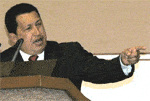VENEZUELA
 |
|
Hugo Chavez: Frosty |
So strong has the trade been during the past six months alone that Venezuela is now the second-largest US trading partner in Latin America, ahead of the previous number-two, Brazil (although still behind Mexico). Total US trade with Venezuela reached $23.3 billion in the first half of the year, an increase of 18.4% or $3.6 billion compared with the same period last year. US exports grew by 35.9% to $4.1 billion, while imports increased by 15.3% to $19.2 billion, according to new US Census Bureau data.
Last year Venezuelan crude oil exports to the US reached $24.1 billion. That represented not only 70% of total Venezuelan exports to the US but also 42.7% of Venezuelas total exports.
Chavez is trying to reduce his dependence on oil sales to the US market and plans to build supertankers that can ship the oil as far as China. But even if the Venezuelan leader succeeds in reducing oil sales to the US, it appears he will have to deal with the consumer boom that the oil bonanza has spurred at home. Despite the ideological course of the government, many chavistas (government supporters) are among the keenest buyers of US goods. Until Chavez restricts imports from the US, the boom is likely to continueas long as oil prices remain high.
Joachim Bamrud



